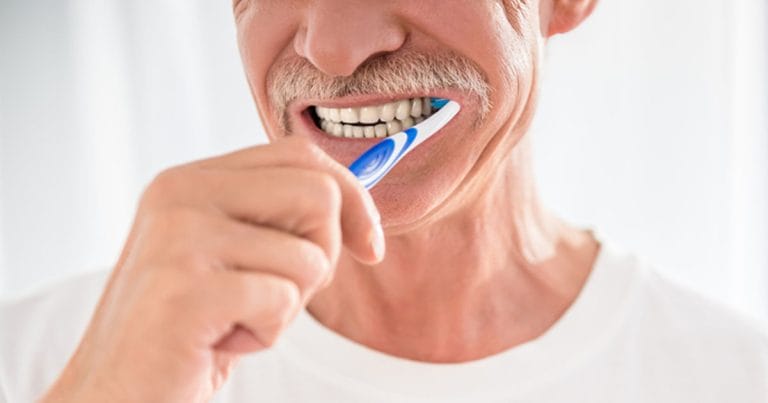Ideally, good oral hygiene habits begin at an early age. However, if that hasn’t been the case with you, then now is an excellent time to start developing those habits. You’re never too old to go to the dentist or take good care of your teeth. Statistically, elderly adults are more likely to have poor dental health because many lost their dental insurance when they retired. According to the CDC, 20 percent of seniors who are 65 years or older have untreated cavities, and almost 68 percent of seniors have gum disease. These are unnecessary statistics and can be prevented with a regimen of good oral care. Missing or damaged or diseased teeth can negatively impact your self-image and self-esteem, so don’t delay in starting a program of good dental hygiene if you don’t already have one.
Does Age Adversely Impact Oral Health?
Age isn’t a determining factor in oral health except as it affects the ability to perform some tasks. For instance, arthritis can make it difficult to brush and floss properly, and diseases such as diabetes can lead to gum disease. Seniors who have diseases such as dementia may forget to brush and floss, and those who have diseases such as osteoporosis may be more susceptible to tooth loss. However, tooth loss isn’t an inevitable part of the aging process, and there are solutions to all of these problems.
- Technological advances in dental appliances can make it easier to brush and floss.
- Home health care assistants can ensure that their geriatric clients maintain good oral care.
- Mouth rinses and mouthwashes can counteract the effects of some diseases such as diabetes and the effects of high glucose levels.
If you need any of these, don’t hesitate to speak to your dental professional about it and take control of your dental health today.
Are Seniors More Susceptible To Oral Health Issues?
Although most health issues can occur at any age, seniors may be more likely to develop some issues, such as the following, because of medications they take and the physiological changes that the medications can cause.
Gum Disease
Also called gingivitis or periodontal disease, gum disease is one of the major causes of missing teeth, and gum disease is very common in elderly adults. Years of poor hygiene can culminate in gum disease and missing teeth. Left untreated, gingivitis can turn into periodontitis, which is a severe stage of gum disease that can damage the facial structure and destroy the ligaments and tissues that secure the teeth. If you suspect you have gum disease, then you should immediately make an appointment with your dentist. The following are common signs of gum disease:
- Bleeding gums when you brush or floss
- Red, inflamed or swollen gums
- Discolored gums that are red or purple
- Receding gums
- Perpetual bad breath
- Loose teeth
- Sensitive gums or teeth
- Pain when you bite or chew
Delaying treatment can adversely affect both your physical and your oral health, so don’t procrastinate. Also, bacteria from gum disease can travel throughout your body and cause problems with all of your major organs, so don’t delay seeking treatment for gum disease.
Tooth Decay
Cavities aren’t restricted to children and young adults, they can occur to anyone at any age. Even if you haven’t had a cavity in decades, you can get one. If you have one or more cavities, then make an appointment with your dentist. If you delay, you can lose the tooth and possibly damage the tooth root. You can also develop an abscess, and the bacteria from it can have a deleterious effect on your major organs.
If you’re diabetic, an infection in your gums or in a tooth can disrupt your blood glucose levels, and conversely, if your blood glucose levels are out of balance, then that can cause dental problems. Maintaining good dental hygiene can help stabilize your blood glucose levels and encourage a healthy body.
If you have dentures instead of natural teeth, it’s equally important to clean them daily and remove them for four hours each day so that your mouth stays healthy. Food particles can accumulate underneath your dentures and cause an infection or gum disease, so make sure you keep your dentures clean and use the recommended cleaner for them.
If you still have your natural teeth, then a process known as attrition, which is wear and tear, can cause your tooth enamel to erode, which increases the likelihood for cavities to develop. Your teeth may become more sensitive as a result, and you may need to switch to a toothpaste for sensitive teeth.
Dry Mouth
Aging doesn’t ensure that you’ll develop dry mouth, but it’s a common side effect of many medications that are prescribed for elderly adults. If you have dry mouth or think you may have, then consult with your dentist or your physician for methods of adding moisture to your mouth. It may seem a small matter, but dry mouth can encourage the formation of cavities, so it’s important to maintain good hydration. Medications are available to help counteract this condition and some lifestyle changes may help.
Good Oral Hygiene Practices
Maintaining good oral hygiene is the same no matter your age.
- Brush and floss at least twice each day
- Use a good quality toothpaste
- Change your toothbrush at least quarterly
- Use an antibacterial mouthwash
- Have regular checkups with your dentist
- Avoid tobacco products
- Limit snacks and sugar intake
- Drink plenty of clear water
- Get enough calcium
- Avoid sodas and sugary drinks
- Maintain your dentures in good condition if applicable
Nutrition
It’s difficult to have an appealing, well-balanced diet when you lack the teeth to chew your favorite foods. Dentures aren’t always the answer because they can make it difficult to bite and chew, so many in the geriatric set stick to soft foods rather than fresh fruits and vegetables and lean protein. Maintaining good dental health may improve your physical health because you’ll be able to eat a variety of foods and you’ll find more enjoyment in eating.
Do You Have Difficulty With Brushing And Flossing?
Many older adults find it difficult to care for their teeth and gums as well as they’d like. Age-related diseases such as arthritis can make these tasks difficult but your dentist can recommend dental aids that will facilitate your regimen of good oral care.
You’re Never Too Old…
No matter your age, it’s never too late to start taking good care of your teeth and gums. Your teeth aren’t just for aesthetics, they’re the first stage in your digestive process, so you need them in order to properly digest your food. In addition to the manual care of brushing and flossing, it’s essential to have at least annual checkups with your dentist so that potential problems can be addressed before they develop into large issues. Start today by scheduling a checkup with 3V Dental Associates today and get started on the road to a healthy mouth and body.



